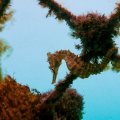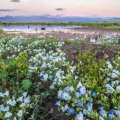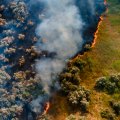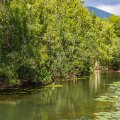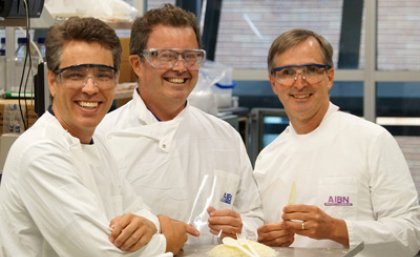
The University of Queensland’s Professor Peter Halley is dedicating elbow grease and research to the challenge of ridding Australia of plastic pollution.
He is developing degradable plastics for agricultural films and food packaging and is also taking part Clean Up Australia Day on March 3 to help remove plastics and other rubbish from Brisbane’s parks and waterways.
And he will have expert help, with two important US collaborators – Colorado School of Mines biopolymers expert Prof John Dorgan and California State University biodegradation specialist Prof Joe Greene – joining him on the day.
“As research engineers I think it is important for us to get our hands dirty and remember why we are doing our research,” Prof Halley said.
“It is about creating sustainable products and processes which minimise our effects on the planet.”
The Australia-US collaboration involves work at UQ’s Australian Institute for Bioengineering and Nanotechnology, School of Chemical Engineering and Queensland Centre for Advanced Materials Processing and Manufacturing.
With funding from industry and government, Prof Halley’s research group is developing environmentally-responsible plastics including degradable agricultural film, smart starch-based food packaging and low-cost plastics using waste treatment by-products.
The US collaborators will help the research group develop eco-friendly alternatives for petroleum-based plastics for packaging and provide sustainable life cycles for plant-to-plant plastic products.
Prof Dorgan brings 20 years of collaboration on bioplastics research and development and Prof Greene will provide biopolymer processing and biodegradation testing expertise from industry and university.
They have also developed green technologies for industry, such as Apple’s iTunes cards and specialised laboratory facilities enabling the study of biodegradation on land and in marine parks.
Prof Halley’s work has resulted in spin-out company Plantic Technologies Ltd in 2002, licensing of oxodegradable agricultural film technology in 2011 and developing new products in 2008, such as injection molded biobased materials.
“I have been interested in recycling and reducing plastic waste since my PhD,” Prof Halley said.
“Global population growth coupled to rapid economic development are increasing water, food and energy needs and putting enormous pressure on our environment.”
“Our work to develop sustainable materials and processes is part of the solution to tread with a light carbon footprint toward a more sustainable future. Direct actions such as Clean-up Australia Day are also part of it.”
Prof Dorgan said he was happy to be involved in the clean-up.
“Australia is a lovely country with a beautiful environment and I’m pleased to be involved both in the hands-on clean-up work and in the important scientific collaboration we have with the Halley group at UQ.”.
The researchers will be cleaning up parkland around the Dutton Park side of the Eleanor Schonell Bridge on March 3 and are looking for volunteers to join their ranks. More information can be found here.
Media: Prof Peter Halley (0412 068 529 or p.halley@uq.edu.au) or Erik de Wit (0427 281 466, 3346 3962 or e.dewit@uq.edu.au)
.jpg)
